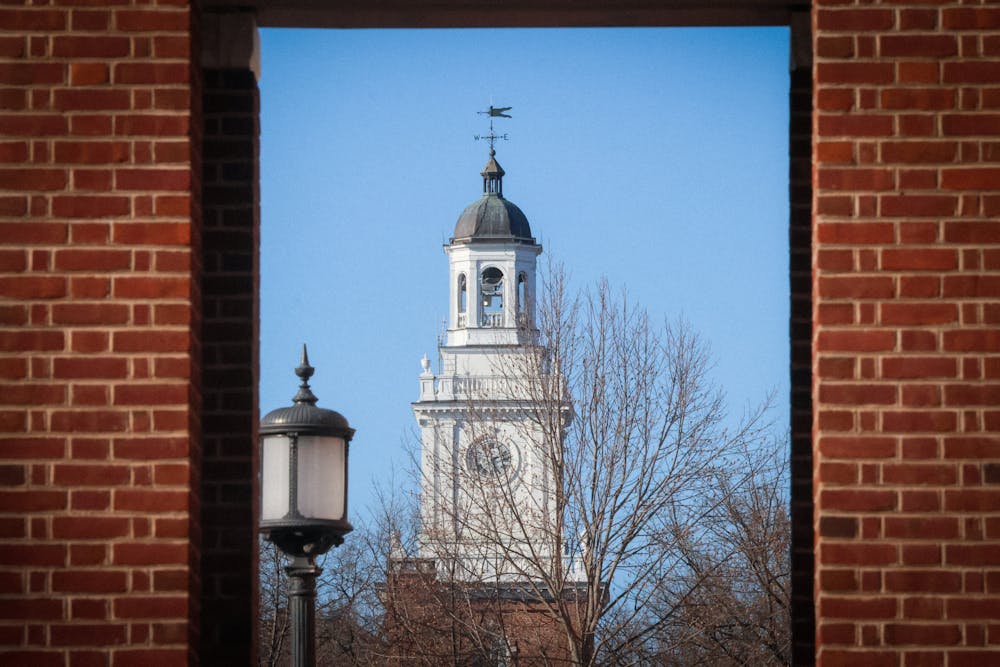As of April 10, the Office of International Services (OIS) stated that the number of graduate students who have had their F-1 visas and records revoked was now “several dozen” on their website, an increase from the “approximately dozen” described on April 8.
On April 8 — the same day that the University spokesperson confirmed the revocation of the initial dozen of visas — Teachers and Researchers United (TRU-UE) sent a letter with five demands to President Ronald J. Daniels, Provost Ray Jayawardhana, Vice Provost Sabine Stanley, University Deans, and the Board of Trustees, calling for the University to take actions to oppose the Trump administration’s policies affecting research, academic freedom and non-citizen students.
The letter was co-signed by UNITE HERE Local 7, the Hopkins Justice Collective (HJC), Hopkins Graduate Students for Justice in Palestine, the Graduate Student Association at the School of Medicine, CAIR Maryland and the executive committee of the American Association of University Professors at Hopkins.
The demands included that the University be declared a sanctuary campus, which includes prohibiting any law enforcement officials from accessing campus to enforce immigration laws and University Public Safety and the Johns Hopkins Police Department (JHPD) from complying with U.S. Immigration and Customs Enforcement (ICE), Customs and Border Protection and the Department of Homeland Security (DHS). According to the letter, the University should also implement a campus-wide notification system to inform Hopkins affiliates of the presence and location of federal law enforcement.
Broadly, TRU-UE also demanded abolishing the JHPD due to the recent cooperation between university police forces with ICE and/or DHS officers at other schools, which they argue threatens students.
“The recent collaboration of other Universities’ private police forces with federal immigration agencies, including (but not limited to) raids on student housing on and off-campus, demonstrates the increased vulnerability of students and workers to police repression. The presence of the JHPD threatens our wider community, severely lacks popular support, and only serves the interests of Hopkins and not of its community,” TRU-UE stated.
Additionally, TRU-UE called on the University to end surveillance and data collection of students and workers in regards to protest and student conduct incidents and/or disciplinary records, educate the community on non-citizen rights and legal support, and commit to funding research projects and providing support for doctoral candidates.
The letter further demanded that the University stand behind their core values by publicly establishing itself as against the politicization of research through participating in legal action against the administration, as well as broadly providing legal and policy resources and support to targeted researchers. Specifically, the letter contended that there has been a lack of action from the University relative to other institutions.
“Even as peer institutions like Yale, Princeton, and Tufts take action to support their students, faculty, and workers, Johns Hopkins has hidden from view, only signing onto one lawsuit against this administration’s overreach–against the cuts to NIH indirect funds,” they wrote. “We demand that [administration] step up in defense of our community, and make clear that efforts to deport non-US citizens, intimidate free speech rights, block research, and censor academic freedom will not be tolerated.”
The letter ended by stating that a University response and receipt of confirmation was expected within 7 calendar days.
In an email to The News-Letter, a University spokesperson stated the University was reviewing the full letter from TRU-UE and will respond directly to them. The spokesperson continued by stating that the University is committed to assisting international students “to the greatest extent permissible under the law” and described resources available to students.
“We share the serious concerns in our community arising from recent federal immigration actions where it appears as though individuals are not receiving full due process under the law, a basic tenet of the American legal system,“ they wrote. “International affiliates are deeply valued members of the Johns Hopkins community, and the university is providing a range of services to aid affected students through the Offices of International Services, Academic Advising, and Student Health and Wellbeing.”
HJC, a cosigner of the letter, supported TRU-UE’s demands on their public platforms and had called for the University to declare itself as a sanctuary campus in a letter to administrators in late March.
Recently, HJC called for students and faculty to make classes hybrid until the University guarantees “protection” for international students and encouraged faculty to support graduate students virtually to finish their programs. HJC demanded that the University issue a formal statement declaring that the University will not allow ICE and/or DHS to enter campus without a warrant and will not comply with requests for student information.
On the OIS website and in a memo providing guidance from Feb. 1, the University stated that federal law enforcement officers are not permitted on non-public areas of campus — such as classrooms, residence halls and faculty offices — without legal authorization including a valid warrant or court order.
In an email to the Hopkins community on Friday, April 11, University administration shared that they would host the first of a virtual briefing series, called Community Updates, focused on immigration and visas. The briefing is scheduled for Tuesday, April 15 form 1 p.m.–1:45 p.m. and will feature Branville Bard, the vice president of Public Safety and chief of police; Tiffany Wright, interim vice president and general counsel; James Brailer, associate vice provost for international student and scholar services; and Stephen Gange, executive vice provost of academic affairs.
“We have heard from many of you with questions about the impact of these actions on your ability to pursue your education, continue research and provide the care and service that is our university’s core mission,” the email stated.
The News-Letter is actively reporting on students who may be targeted for visa termination, detainment or actions by ICE. If you have any information, please send a tip to tips@jhunewsletter.com or utilize our anonymous tip form.





